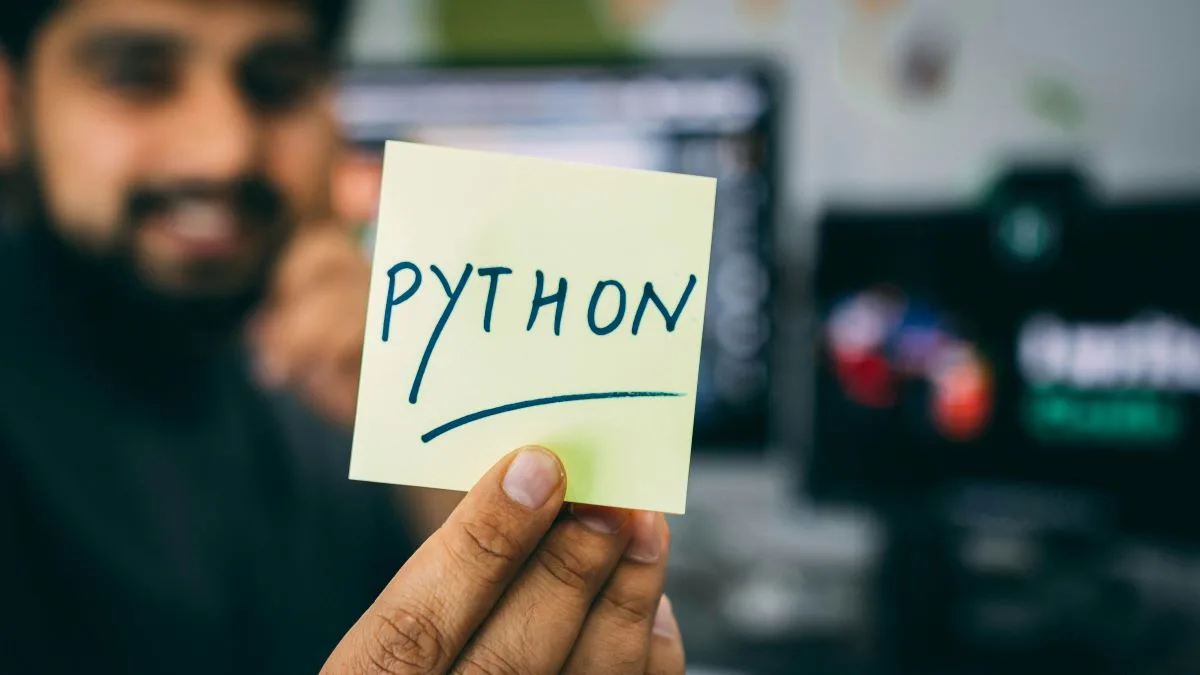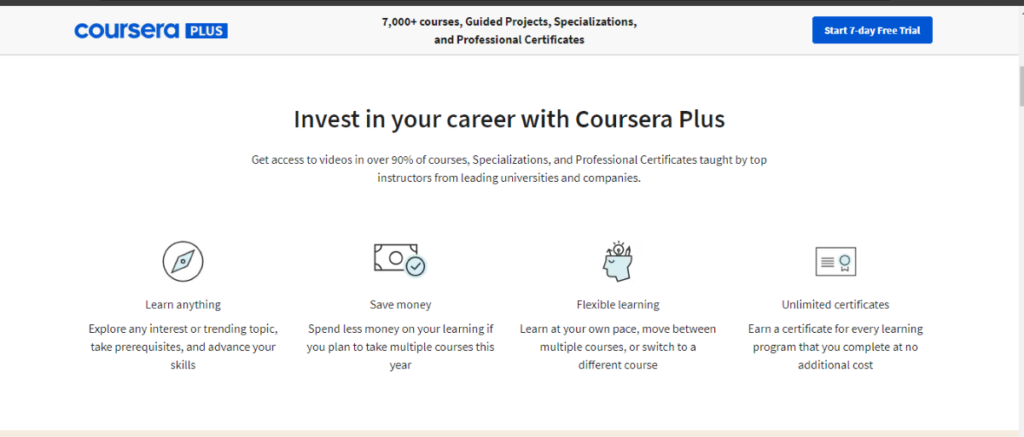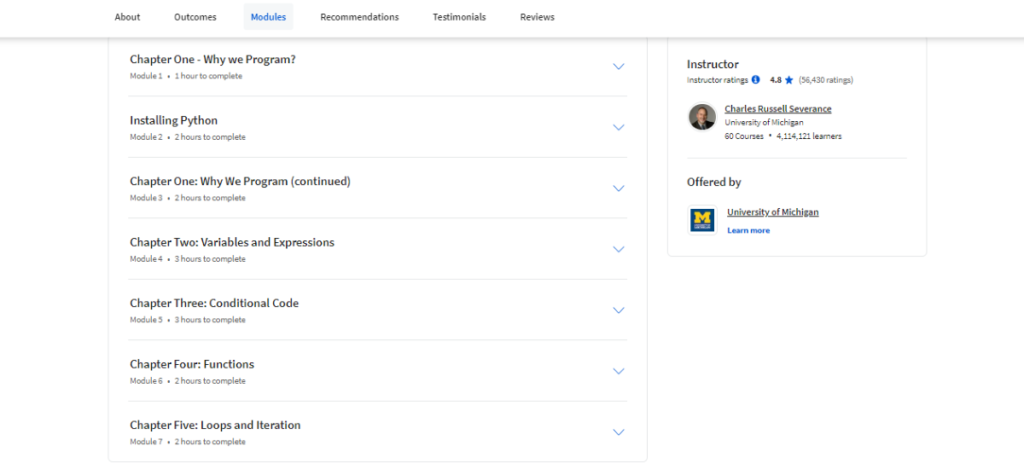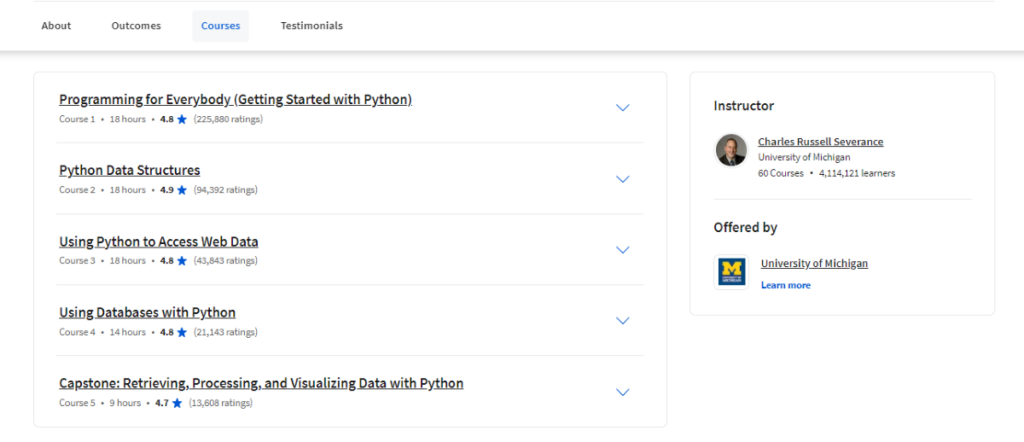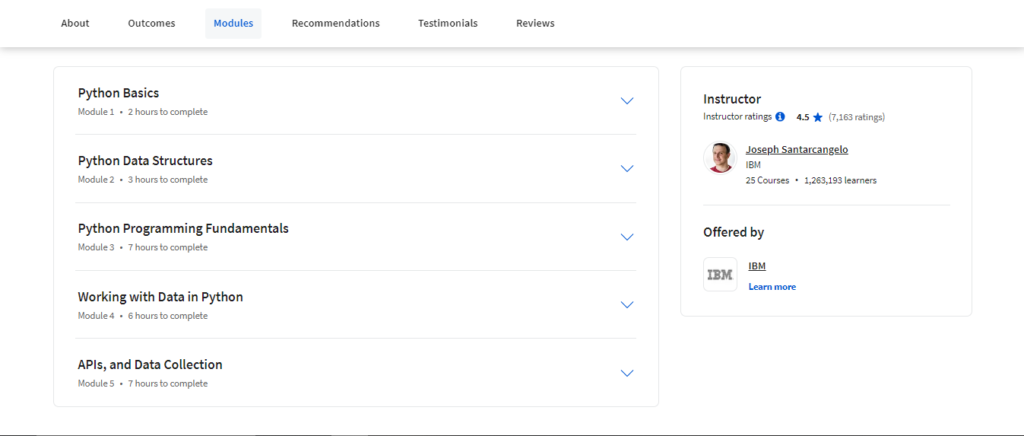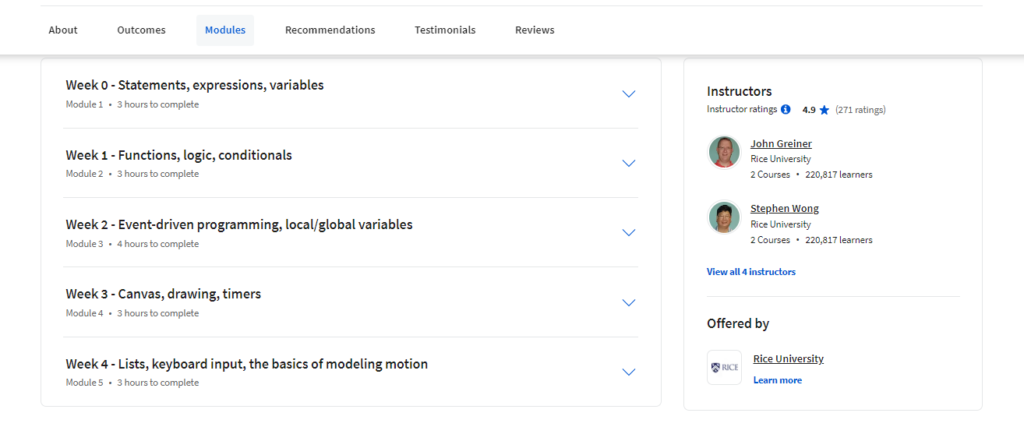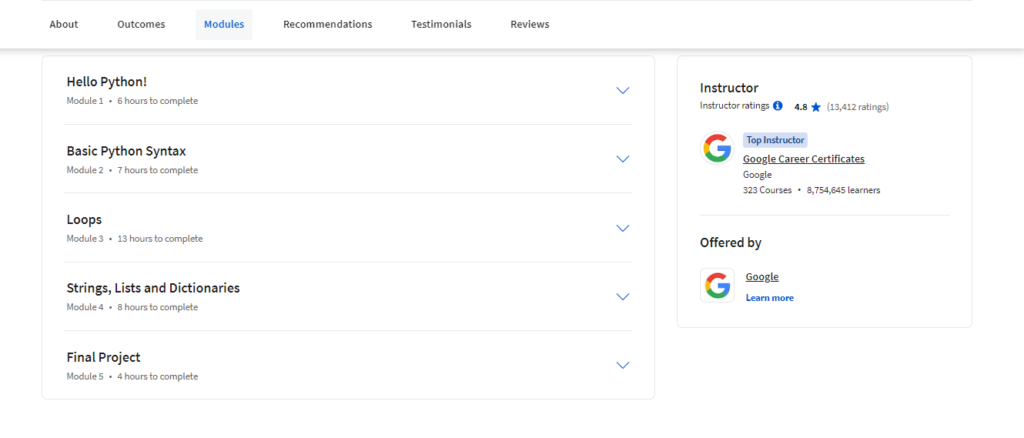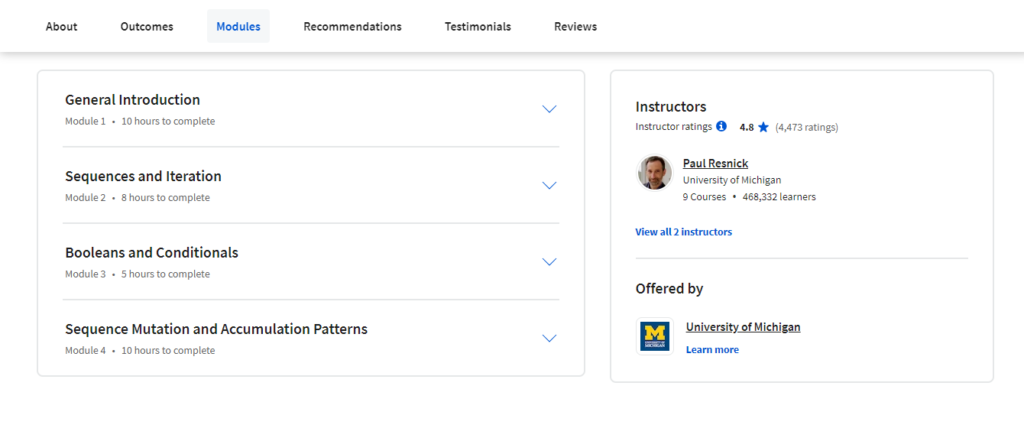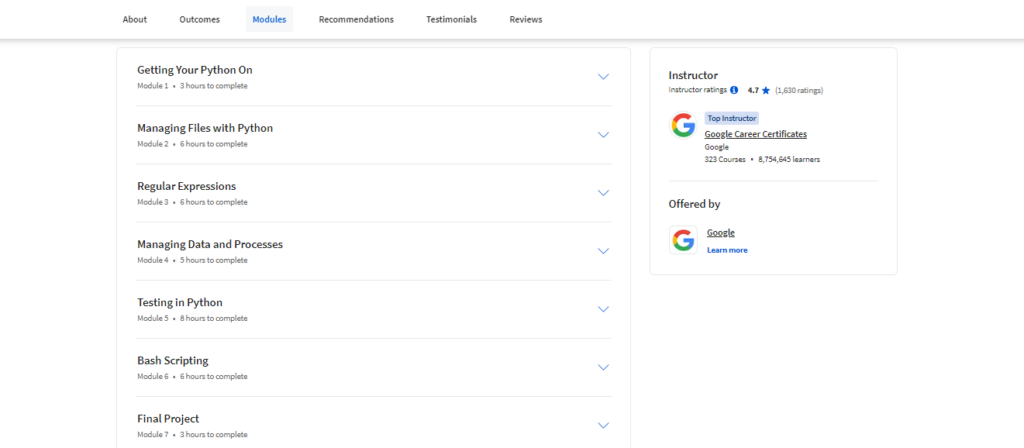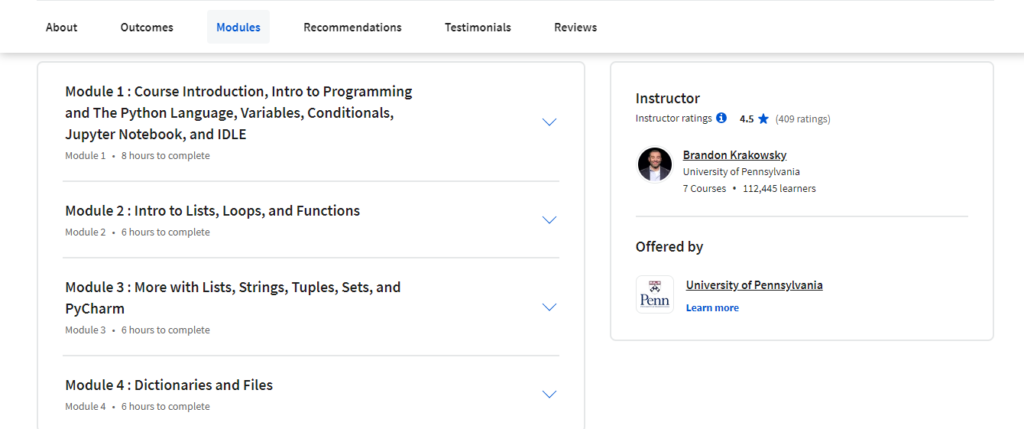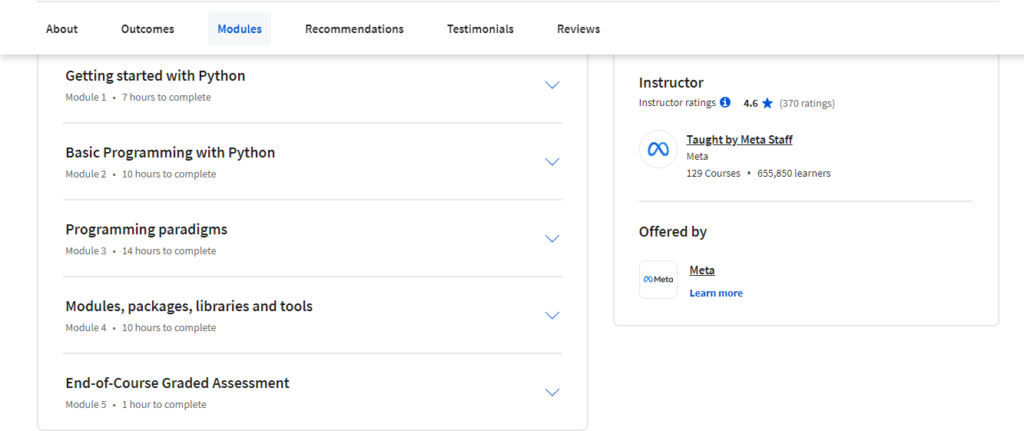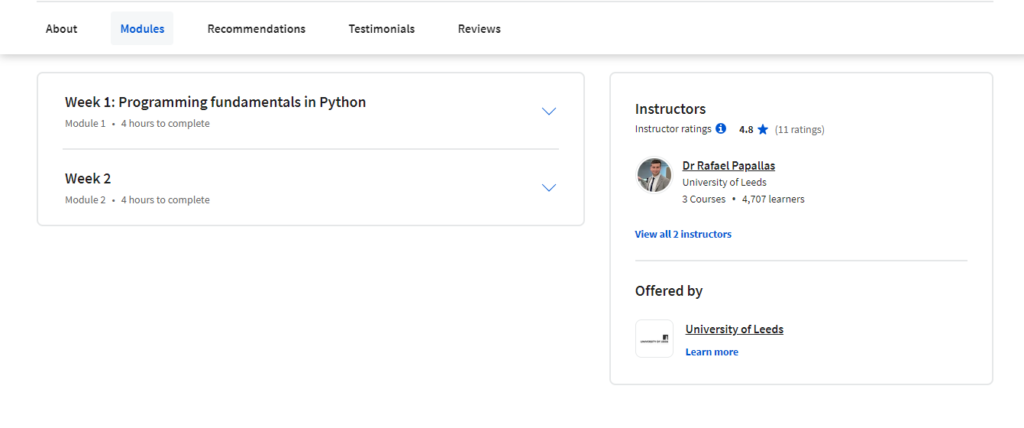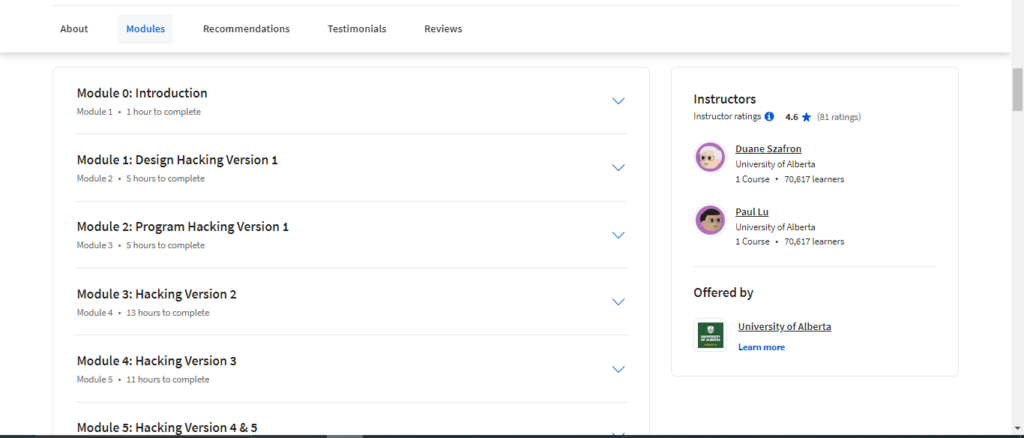Last updated on August 1st, 2025 at 10:54 pm
Learning Python is an excellent choice if you’re looking to explore career possibilities in web development, data science, software development, game development, machine learning, artificial intelligence, etc.
However, choosing among a plethora of possibilities for a course or certification program is a hard task.
We have compiled a list of the best Python courses and specialization courses for beginners in this post. To find the course that best meets your needs, simply take a look at these offerings.
Python is the most popular programming language, as we all know, and has a large developer community. Because of Python’s promising future and attractive salary package, everyone is eager to learn more about it and pursue a career in it.
To accomplish this, we must choose the ideal path or guide to take when we embark on our quest. In this beginner-friendly blog, we’ll discuss the best Python courses and certifications.
These courses are not only well recommended, but they also give you conveniences like question-and-answer sessions to make studying easier.
To help you choose the finest Python course for your needs, let’s get to know each of them separately.
Check Also:
Best JavaScript Courses for Beginners
Best Java Courses for Beginners
What Is Python?
Python is a general-purpose, high-level programming language that prioritizes ease of use. By hiding the unsightly aspects like memory management and code boilerplate and choosing friendly, human-readable code instead, it simplifies the development process. It is among the greatest languages for beginners to learn because it is simple to understand.
Unlike languages like Java or C, Python places a strong emphasis on code readability, enabling programmers to convey ideas in fewer lines of code.
Object-oriented programming support, a large collection of pre-built data structures, and dynamic semantics are some of the main features.
History of Python?
Guido van Rossum started working with Python in the Netherlands’ Centrum Wiskunde & Informatica (CWI) in the late 1980s.
With its ability to handle exceptions and interface with the Amoeba operating system, the ABC programming language was intended to be replaced by Python.
Inspired by his previous work on ABC, Guido developed Python as a hobby project over the Christmas season. He improved ABC’s syntax and integrated it with new features to develop a scripting language that fixed its shortcomings.
The name “Python” was chosen by Guido in response to his appreciation of the BBC television series “Monty Python’s Flying Circus” and his need for a short, distinctive, and slightly enigmatic moniker.
From July of 2018 until his resignation, Guido had the title of “Benevolent Dictator for Life” (BDFL).
The first versions of Python were implemented in December 1989, and the language was formally released in 1991.
Code readability and increased developer efficiency were key components of its design philosophy.
Because of its elegance and simplicity, Python became more and more popular, and major software companies like Dropbox, Google, Quora, Mozilla, and IBM adopted it.
Python’s evolution
The most recent stable version of Python is 3.12.2, though there have been other versions as well.
Python 2.x and Python 3.x are the two most popular versions, and each has a following.
Software testing, scripting, development, and generating are among the uses for Python.
Learn New Skills with Coursera Plus
- Coursera Plus offers education from more than 275 top colleges and businesses.
- Included in your subscription is unlimited access to over 7,000 top-notch courses, practical projects, and career-ready degree programs.
- Access videos for more than 90% of courses, professional certificates, and specializations offered by eminent faculty members from prestigious colleges and businesses.
- Take prerequisites, investigate any topic of interest or current interest, and develop your talents.
- A 7-day free trial is included with the monthly subscription, and a 14-day money-back guarantee is offered with the annual subscription. With Coursera Plus, you can access 90% of their online courses indefinitely as part of a membership plan.
- If you want to take more than one course this year, then spend less money on your education.
- You can move between courses, learn at your own pace, or choose a new course.
- Receive a certificate of completion for each course you finish at no extra charge.
- All of this for only $59 a month or $399 a year.
List of the Best Python Courses for Beginners
1. Programming For Everybody (Getting Started With Python) – Offered By University Of Michigan
When it comes to the best Python courses for beginners, this one is our top pick. The University of Michigan is offering a course on Coursera for beginners.
One of the most well-liked Python courses available on Coursera, it begins with computer fundamentals and computer programming so that any student may grasp the ideas with ease.
While prior coding expertise is not necessary for this course, it is helpful to have a foundational understanding of maths in order to follow instructions. This course is easy, understandable, and masterable by anyone with a basic understanding of computers.
One of the specialist courses offered on Coursera is Python for Everyone, which includes the Programming For Everybody course. You can enroll in advanced programming classes and understand them better after finishing this introductory Python course.
Course Highlights
Institution – University Of Michigan
Platform – Coursera
Level – Beginner Level
Instructor – Charles Russel Severance
Duration – 19 Hours Approx
Rating – 4.8
Language Options – 22 Languages Available
Schedule Type – Flexible Scheduling
What You Will Learn
There are five chapters in this course on Python programming, the first of which covers the fundamentals of programming and explains the need for computer programming.
You will then discover how to set up Python on your computer and run programs on it. You will master all the fundamentals of Python, including how to use variables and expressions—which might be of various data types—in the code.
Afterward, conditional statements, functions, and their usage in the code will be covered. You’ll understand how functions can aid in the understandable organization and management of complex codes.
Additionally, you will learn about loops and how to incorporate iterations and loops into your program.
You will be able to develop Python programs that process inputs and output results by the conclusion of this course.
2. Python For Everybody Specialization Course – Offered By University Of Michigan
The next Python course is called Python for Everyone Specialization, which combines five Python courses with the goal of giving students a thorough understanding of Python programming and additional applications.
This specialty course begins with the previously described course, “Programming for Everybody.” In addition, you will study four more courses in Python programming, which are as follows:
- Python Data Structures
- Using Python To Access Web Data
- Using Databases Using Python
- Capstone: Retrieving, Processing, And Visualizing Data With Python
This specialized course is among the greatest Python courses offered on the Coursera platform because it includes all these modules in its learning program.
Course Highlights
Institution – University Of Michigan
Platform – Coursera
Level – Beginner Level
Instructor – Charles Russel Severance
Duration – 2 Months
Rating – 4.8
Language Options – 22 Languages Available
Schedule Type – Flexible Scheduling
What You Will Learn
Of course, the first part of this course will teach you the fundamentals of Python programming.
After that, you will study Python data structures and discover how to apply tuples, dictionaries, and lists to sophisticated data analysis. This course will also cover data structures and strings.
Python online data access will be covered in the upcoming course. This lesson will teach you how to access, scrape, parse, and read web data using web APIs, as well as how to leverage the internet as a data source. Additionally, you will learn about Python’s XML, HTML, and JSON data formats.
In order to help with data collection, analysis, and processing, the course’s subsequent section covers the fundamentals of database design and structured query language (SQL). To comprehend the course material, you will use the D3.js library and SQLite3 database.
The last part of this specialized course covers using Python to retrieve, process, and visualize data. For these activities, students need to write a number of Python apps.
Thus, all of the material that students have studied in the course’s earlier sections must be applied to this.
By the completion of this Python for Everyone specialized course, you will be able to program in Python, use Python to analyze data, and develop apps that use Python to collect, clean, analyze, and visualize data.
3. Python For Data Science, AI, And Development – Offered By IBM
IBM offers a beginner-friendly Python programming course called Python for Data Science, AI, and Development. This course offers an effective way to learn Python, from the fundamentals to programming and handling data.
Even if you have never programmed before, after finishing this course, you will be prepared to work in Python.
It is a hand-picked Python programming course designed for software development and data science. This Python course is appropriate for individuals interested in learning about software development, artificial intelligence, data science, data analytics, data engineering, and related fields.
Course Highlights
Institution – IBM
Platform – Coursera
Level – Beginner Level
Instructor – Joseph Santarcangelo
Duration – 26 Hours Approx
Rating – 4.6
Language Options – 20 Languages Available
Schedule Type – Flexible Scheduling
What You Will Learn
Each of the five modules in this Python course covers a different Python topic. The fundamentals of Python, including data types, variables, expressions, mathematical operations, etc., will be covered initially.
Data structures, such as lists, tuples, and dictionaries, along with their purposes, are covered in the following module. Additionally, it describes the differences between each sort of data structure. By the time this module ends, you will know how to use several Python data structures.
Following that, you will study the foundations of Python programming, including conditional statements, branching, loops, iterations, and functions. You will gain knowledge about object-oriented Python programming and how to write functions for various purposes.
The next thing you will learn is how to use Python to work with data. This includes using Python libraries to help with data processing and mathematical operations, as well as reading and writing files.
You’ll understand how to gather and analyze data from various file formats using web scraping and APIs.
This is how the Python for Data Science, AI, and Development course condenses and presents material on everything from Python basics to Python programming. You will be able to program in Python and possess knowledge of data science and analysis after completing this course.
4. An Introduction To Interactive Programming In Python Part 1 – Offered By Rice University
As the course title suggests, this course prepares students to develop various applications using Python by providing an introduction to the language. This course is essentially a component of the specialization on computing foundations, which is designed for students with no prior computer experience.
This beginner course on Python programming will be an excellent option if you’re looking to enroll in a course to understand the principles and foundations of programming.
Course Highlights
Institution – Rice University
Platform – Coursera
Level – Beginner Level
Instructor – John Greiner, Stephen Wong, Scott Rixner, Joe Warren
Duration – 19 Hours Approx
Rating – 4.8
Language Options – 20 Languages Available
Schedule Type – Flexible Scheduling
What You Will Learn
The fundamentals of Python programming, including variables, expressions, data types, conditional statements, functions, etc., are covered in detail in the first section of this course.
Eventually, you’ll discover how to utilize these components to make interactive applications that do the desired tasks. You will understand the distinction between local and global variables as well as event-driven programming. This aids in the creation of basic guessing games, timers, and Python canvases.
You will be able to replicate the popular arcade game “Pong” using Python and will understand what lists and model moving objects are in the language.
You will learn about computer programming, programming concepts, python syntax and semantics, and Python programming by the end of this course.
5. Crash Course On Python – Offered By Google
Crash Course On Python is an introductory course that teaches the basics of Python programming and shows students how to write basic Python programs utilizing structures.
Enrolling in this course will allow you to learn Python programming fundamentals even if you have never programmed before. After completing this course, you will comprehend the fundamentals of Python, its syntax, the advantages of Programming in IT roles, and the workings of its various components.
After completing this Google crash course on Python, you will be able to develop basic Python programs and apply your newly acquired skills to tackle challenging programming puzzles.
Course Highlights
Institution – Google
Platform – Coursera
Level – Beginner Level
Instructor – Google Career Certificates
Duration – 39 Hours Approx
Rating – 4.8
Language Options – Video Subtitles Available
Schedule Type – Flexible Scheduling
What You Will Learn
This course covers all the essentials of Python programming, from the very beginning to comprehending concepts through easy exercises and real-world examples. Even someone without any programming experience may pick up the language and learn how to program in Python from scratch.
It is divided into five modules, the first of which is an introduction to Python. You will study Python syntax, scripting, and fundamental functions in this section. Additionally, it provides mathematical operations, linguistic keywords, and integrated development environments (IDEs) for writing Python code.
In the second module, the syntax of Python is covered in more detail, along with an explanation of variables, various data types, and how to convert one data type to another. Additionally, you will learn how to create functions and utilize them in your projects. In order to compare data and write branching scripts, you will also investigate logical operators.
The remainder of the course covers Python loops and iterations, as well as how to use the range() function with loops. Subsequently, you will learn about Python’s advanced data types, such as dictionaries, tuples, and lists. This session will teach you how to effectively store, reference, and work with various data structures.
You learn how to solve problems in Python with this module. You will acquire the skills necessary to comprehend an issue, do research to find viable solutions, and formulate a plan of action.
All things considered, the crash course on Python teaches you the fundamentals and programming principles of the language, preparing you to use it to solve problems.
6. Python Basics – Offered By the University Of Michigan
Anyone new to the world of Python programming will benefit greatly from taking the beginner-friendly course Python Basics. It covers everything from Python 3 fundamentals to data structures, strings, conditional expressions, iteration, and more.
During this course, you will learn how to draw reference and turtle diagrams in Python on the screen. Additionally, it concentrates on improving your programming debugging abilities. To enroll in this course, you do not need to know how to program.
If you’re a computer programmer with some expertise and would like to learn more about Python programming, you might think about signing up for this course. Additionally, this course is open to people who understand Python programming essentials but would like to review them.
Course Highlights
Institution – University Of Michigan
Platform – Coursera
Level – Beginner Level
Instructor – Paul Resnick, Steve Oney
Duration – 34 Hours Approx
Rating – 4.8
Language Options – 20 Languages Available
Schedule Type – Flexible Scheduling
What You Will Learn
This course serves as the prerequisite for the Python 3 Programming Specialization. Enrolling in that specialized course will enable you to learn Python programming in-depth. If all you want to do is learn the fundamentals, this course is for you.
There are four modules in all, with an introduction to Python being the first. You will learn how to develop Python programs and use them to draw graphics in this chapter.
The definitions of sequences and iterations in Python are covered in the second module. You’ll discover Python data types, including strings, tuples, and lists, and gain an understanding of how loops operate. You will be able to develop sophisticated programs with For loops that generate graphics after finishing this level.
After that, you will learn about the boolean data type and the various kinds of conditional expressions, including nested, chained, binary, and unary conditional statements. You’ll learn how to include these components in an accumulation pattern as well.
The final exam, which you must attend, will determine how much you have studied and what knowledge and abilities you have retained throughout the course.
7. Using Python To Interact With The Operating System – Offered By Google
This Google course aims to teach you how to set up and operate your own Python development environment. This course teaches you how to use Python to develop automation. You’ll discover methods for automating system administration chores and how to use Python regular expressions.
Additionally, you will study bash language and know when and how to use it. You will have learned how to utilize regular expressions to process text files, modify files and processes in the operating system, and use Linux command lines in a virtual machine at the end of this course.
This course can be the greatest option for you if you’re searching for a Python course that concentrates on using Python with an operating system and on building automation solutions with Python.
Course Highlights
Institution – Google
Platform – Coursera
Level – Beginner Level
Instructor – Google Career Certificates
Duration – 41 Hours Approx
Rating – 4.7
Language Options – Video Subtitles Available
Schedule Type – Flexible Scheduling
What You Will Learn
This course on Python is divided into seven sections, including textual and video materials in each. The first module covers operating system types and how to write a Python program that works with the operating system.
Additionally, this chapter covers how to set up your own development environment and use it with your programs. Additionally, you will grasp how the operating system and Python interact with one another and be able to manage files using Python.
You will have a better understanding of regular expressions and their significance. Basic to advanced explanations of regular expressions are provided in the third module.
You will next learn how to use Python to manage processes and data. You will become familiar with log files and Python subprocesses, as well as be able to comprehend the data that log files produce.
The testing idea is covered in Python in the fifth module, which also defines testing and discusses the distinctions between automated and manual testing. It also discusses how to handle problems and covers unit, black box, and white box testing.
This course’s next topic, which deals with Linux OS, is bash scripting. You will study the fundamental commands and redirections in Linux in this part. Additionally, it will teach you how to write bash scripts so you can know when to use Python and when to utilize Bash.
Lastly, using the knowledge and abilities you have gained from the preceding modules, you must produce a final project. In this instance, the problem statement must be addressed, potential solutions must be investigated, and a coding solution must be written.
8. Expressway To Data Science: Python Programming Specialization – Offered By University Of Colorado Boulder
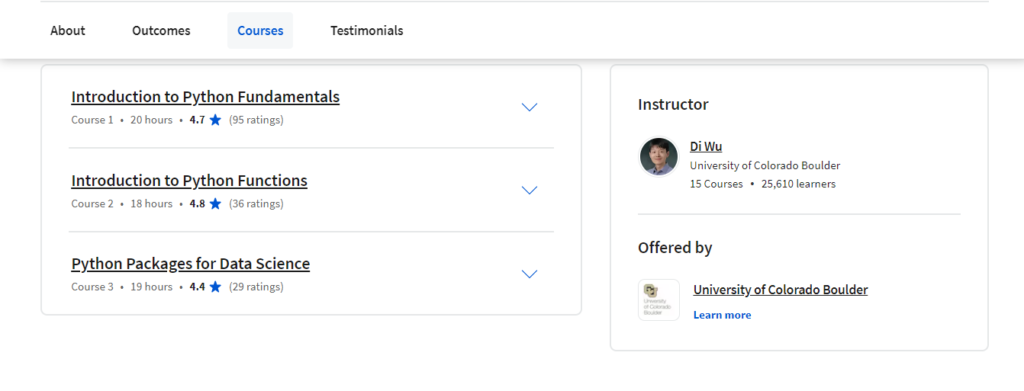
The University of Colorado Boulder’s specialized Python programming course is available on the Coursera platform and is the eighth Python course on this list. In order to give students a comprehensive understanding of the subject, this specialized course combines three Python courses provided by the same university.
The following are those three curses:
- Introduction To Python Fundamentals
- Introduction To Python Functions
- Python Packages For Data Science
You can acquire abilities ranging from the application of Python packages for data science to the principles of Python programming by enrolling in this course. Programming in Python is simple and enjoyable in this course because all concepts are demonstrated through step-by-step instructions.
For individuals without programming experience who wish to study Python programming for data science, this specialized course is an excellent option.
Course Highlights
Institution – University Of Colorado Boulder
Platform – Coursera
Level – Beginner Level
Instructor – Di Wu
Duration – One Month
Rating – 4.7
Language Options – 19 Languages Available
Schedule Type – Flexible Scheduling
What You Will Learn
You will know the basics of Python at the end of the course, as well as how to manipulate data using pandas and numpy and visualize it with matplotlib and seaborn.
The first course in this bundle goes over the fundamentals of Python, including variables and data types. It also teaches you how to write basic Python applications.
The focus of the second course is on functions in Python, including user-defined, predefined, and package functions. You will gain knowledge about defining your own functions as well as using Python’s built-in functions.
The third course explains data science-specific Python packages and shows you how to use them in your program. Additionally, it covers the libraries matplotlib and seaborn for data visualization and the numpy and pandas libraries for data manipulation and analysis.
9. Introduction To Python Programming – Offered By the University Of Pennsylvania
The University of Pennsylvania offers an introductory course in Python programming as part of their Python Programming Specialization. Although it is not necessary for students to have programming experience, it may be beneficial when learning the material.
However, in order to understand programming expressions, a basic understanding of mathematics is required. Students will learn about the fundamentals of Python programming as well as the various tools available for writing and executing Python programs in this course. After finishing this course, students will be able to develop basic Python applications.
With a deeper dive into several Python programming subjects, this introductory course helps students gain a better knowledge of Python programming. This course could be helpful for you if you’re seeking a Python programming course that will provide you with a thorough understanding of coding fundamentals and allow you to write your own Python programs.
Course Highlights
Institution – University Of Pennsylvania
Platform – Coursera
Level – Beginner Level
Instructor – Brandon Krakowsky
Duration – 27 Hours Approx
Rating – 4.5
Language Options – 20 Languages Available
Schedule Type – Flexible Scheduling
What You Will Learn
The beginner’s course on Python programming consists of four modules, with assignments, quizzes, texts, and videos in each module. An introduction to Python programming and programming ideas is provided in the first module.
To write and run Python routines, you will need to download and install the required software. Next, you’ll learn how to use fundamental arithmetic expressions and basic Python data types. Variables, Python scripts, and conditional expressions will then be covered.
Common Python data structures, such as lists, are explained in the second module. Additionally, loops—which are useful for repeatedly running a collection of code—are described. Then, you will be familiar with Python functions, both user-defined and predefined.
You will learn about Python’s various data structures, including lists, tuples, strings, and sets, as well as the PyCharm IDE. You will, at last, comprehend how to use these components to manipulate data.
In the course’s last module, files and dictionaries are introduced, along with an overview of Python’s data storage system. By the time this course ends, you will know more about Python’s capabilities and how to apply them to your work.
10. Programming In Python – Offered By Meta
Those who wish to learn database engineering and backend development in order to pursue a career in this industry can enroll in the beginner-friendly Python programming course. While basic internet and arithmetic abilities are beneficial, it is not necessary to have programming experience to enroll in this course.
The fundamentals of Python programming are covered in this course, which also prepares you to use code to solve issues. The syntax and fundamentals of Python, including libraries, classes, objects, variables, loops, and data structures, will be more deeply understood by you.
You will know more about the foundations of Python at the end of this course, and you will be able to identify issues and write Python routines to fix them.
Course Highlights
Institution – Meta
Platform – Coursera
Level – Beginner Level
Instructor – Meta Staff
Duration – 44 Hours Approx
Rating – 4.6
Language Options – 10 Languages Available
Schedule Type – Flexible Scheduling
What You Will Learn
The first of this course’s five chapters provides an overview of the basics of the Python programming language. It provides an overview of computer programming fundamentals.
The syntax of Python and the usage of data types, functions, and loops are covered in the following chapter. You’ll be able to identify mistakes and correct them as well.
You will discover the patterns of Python programming, such as object-oriented programming, logical principles, and algorithms, in the third chapter. Along with exploring various testing approaches and styles, you will also study well-known Python libraries and tools.
Putting all you’ve learned in earlier chapters into practice is the focus of the last chapter. Therefore, you may evaluate your skills and use this as a self-assessment.
11. An Introduction To Programming Using Python – Offered By the University Of Leeds
This Python programming course is an excellent option for you if you want to enroll in a straightforward and fundamental course to comprehend programming concepts and learn how to develop Python applications.
You can expand your programming skills and learn about a variety of job options, including task management, data analysis, web and software development, and more.
Through hands-on projects and exercises, this course will help you gain a deeper understanding of Python programming by covering all the principles of computer programming.
Course Highlights
Institution – University Of Leeds
Platform – Coursera
Level – Beginner Level
Instructor – Dr Rafael Papallas, Click Start
Duration – 9 Hours Approx
Rating – 4.7
Language Options – English
Schedule Type – Flexible Scheduling
What You Will Learn
In the first module of this introductory course on Python programming, the fundamentals of Python programming are explained. In this lesson, you will learn the fundamentals of computers and computer programming.
Additionally, you will master the fundamental grammar of Python, which covers variables, data types, inputs, outputs, etc. Following that, you will be able to independently write code and create basic Python programs.
An introduction to loops, functions, conditional statements, and other advanced programming topics is provided in the second module. By the time this course ends, you’ll know how to code in Python. It also has a tutorial on writing a Python program to control a little virtual robot in space.
12. Problem Solving, Python Programming, And Video Games – Offered By University Of Alberta
This course on Coursera is intended for beginners and focuses on computer science and Python programming. You will be able to solve computational problems with the help of this course by applying problem-solving strategies, including abstraction and problem decomposition.
You will discover how to use Python’s building pieces to construct designs. It makes interesting connections between the Python programming language and video games to help you comprehend computer science fundamentals. It acts as a medium for teaching pupils Python syntax, semantics, and lexicon.
It guarantees that students acquire programming abilities in Python and use those skills to solve issues in other programming languages, computer science courses, and non-gaming contexts. In essence, it’s a course that gives newbies the opportunity to delve deeper into Python programming and apply that knowledge to solve problems.
While prior programming knowledge is not required, students who want to succeed in this course should be able to use computers and maths concepts.
Course Highlights
Institution – University Of Alberta
Platform – Coursera
Level – Beginner Level
Instructor – Duane Szafron, Paul Lu
Duration – 80 Hours Approx
Rating – 4.3
Language Options – 20 Languages Available
Schedule Type – Flexible Scheduling
What You Will Learn
This course consists of twelve lessons that introduce you to a new area of video games and Python. Introduction to computer science, problem-solving, programming in Python, and game creation are the main topics of the first module.
Making the first iteration of the game, termed hacking, is the topic of the upcoming module or chapter. This chapter will teach you problem-solving techniques that will help you with your design process, like decomposing problems into their component parts and using algorithms.
You will examine how lexics, syntax, and semantics are used to understand and represent programming languages in the upcoming chapter. This will assist you in comprehending and utilizing Python expressions in your design. After that, you’ll go over Hacking Version 1 using the abstraction problem-solving technique to identify and address issues.
As a result, during this course, you will create hacking versions 2, 3, 4, 5, 6, and 7.
You will learn how to create and manage Poke the Dots, a brand-new graphical game, in the final four chapters. The methods outlined in the course will allow you to develop versions 1, 2, 3, 4, and 5 of this game.
FAQs
What are the benefits of using Python?
1. Python is an object-oriented language that facilitates object-oriented programming.
2. Developers may easily learn this language due to its clear syntax.
3. Variables are typed dynamically in a language that uses dynamic typing.
4. Python boasts a vibrant library ecosystem.
5. Pre-existing modules are available for use by developers.
6. Python’s growth is facilitated by its community.
7. It is interactive and portable, running on a variety of operating systems.Is Python an interpretive or compiled language?
Python is primarily interpreted and only slightly compiled. Python code initially compiles to bytecode before being executed by the Python virtual machine (p.v.m.), which interprets the code according to the platform (computer and operating system) in question.
Which Python apps are now in vogue?
Python is utilized in several fields, such as Machine Learning and Data Science. Some popular applications of python are:
1. Data Science
2. Machine Learning
3. Deep Learning
4. Artificial Intelligence
5. Scientific Computing
6. Scripting
7. Networking
8. Game Development
9. Web Development
10. Web Scraping.What are the fundamentals of programming in Python?
Python’s syntax is straightforward and resembles that of English. It is employed in many different fields, such as web development, game development, and system scripting.
Can someone who has never programmed learn Python?
Absolutely, even if you have never programmed before, you can learn Python. Novices can easily understand it because of its variety and ease of reading.
Who and when invented Python?
Guido van Rossum invented Python, which saw its initial release in 1991.
How can I write Python comments?
Python comments begin with the hash symbol (#) and go on until the end of the line. They are employed in the code to offer clarifications or annotations.
Which data types exist in Python?
A variety of data types, such as integers, floats, strings, booleans, lists, tuples, dictionaries, and sets, are supported by Python.
Is using Python free?
Yes, both commercial and non-commercial usage of Python is permitted as it is an open-source software.
Is there a way I can help develop Python?
Indeed, community contributions are encouraged, and the Python Software Foundation (PSF) oversees the development of the language. Writing code, taking part in conversations, or reporting bugs are all ways you may help.
Final Thoughts – Best Python Courses For Beginners
For those who are interested in developing software, data science, engineering, or just having fun, learning Python can lead to many opportunities. Choosing from among the many available online courses can have a significant impact on your educational journey.
The top Python courses accommodate a wide range of learning objectives and methods, from thorough tutorials for beginners to advanced specialization programs. There is a course that will fit your needs, regardless of whether you want to build online applications, analyze data, automate processes, or learn more about machine learning.
You can become a part of a dynamic community of professionals and learners by investing in a high-quality Python education in addition to gaining useful skills.
With this post, we hope you have chosen the ideal path for your learning. Share this article with your friends and coworkers if you think it’s helpful.
Share Now:
Related Articles
How To Choose The Right Course?
How To Install Python On Windows
Top 10 Udemy Courses for Aspiring Data Scientists
11 Best Machine Learning Courses Online
14 Best Deep Learning Courses Online
Discover more from technicalstudies
Subscribe to get the latest posts sent to your email.

